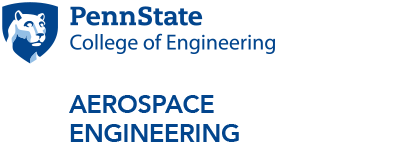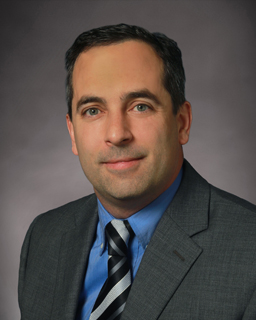Department welcomes new faculty member
8/24/2016
UNIVERSITY PARK, Pa. – The Department of Aerospace Engineering is excited and proud to welcome Alan R. Wagner as its newest faculty member.
Wagner comes to Penn State as an assistant professor, having previously been a social robotics researcher at the Georgia Tech Research Institute (GTRI), where he worked in the Aerospace, Transportation and Advanced Systems Laboratory. He will also be affiliated with, and co-funded by, the Penn State Rock Ethics Institute.
“The field of aerospace engineering is replete with topics that demand ethical thinking from our students, and the advent of autonomous drones brings new challenges. We are delighted to have recruited Dr. Wagner to Penn State—his research in the ethical dimensions of human-robot socialization and its applications to interactions between pilots and unmanned aerial vehicles fits very well with the future we see,” said George Lesieutre, associate dean for research in the College of Engineering and former head of the aerospace engineering department. “We believe he will have a real impact on the ethics community on campus, helping to address broader questions related to what decisions humans should allow robots to make on our behalf.”
In this newly created, highly interdisciplinary position, Wagner will primarily focus his research on developing the theoretical underpinnings necessary for human-robot social relations and the design and creation of systems which can interact with people pro-socially as they relate to unmanned aerial vehicles (UAVs) in search-and-rescue and humanitarian missions.
He will also focus on helping policymakers understand the ethical ramifications of developing such systems and integrating ethics into the aerospace engineering curriculum.
“I’m absolutely excited about this opportunity—to explore the combination of aerospace engineering, UAVs, and ethics—which is something that hasn’t ever been done at Penn State but is quickly becoming a critical societal issue,” said Wagner. “My goal is to positively influence the development of robots that can not only interact with humans, but are also capable of representing, reasoning, and developing relationships with others in a variety of environments.”
Wagner’s research borrows heavily from social psychology, behavioral economics, and artificial intelligence, focusing on higher, cognitive aspects of human-robot socialization. His recent work has focused on the development of a framework based on social psychological and game theory that allows a robot to computationally represent its social interactions with a human, which has led to insights into higher social phenomenon such as trust, deception, and stereotyping, as well as computational methods that allow a robot to reason about whether a situation demands trust or warrants deception.
“Knowing when and whether to trust robots and how much autonomy to give them are questions that will become increasingly important to society,” said Philip J. Morris, interim head of aerospace engineering and Boeing/A.D. Welliver Professor of Aerospace Engineering. “I am pleased that aerospace engineering and the Rock Ethics Institute combined resources to establish Alan’s position to provide valuable insight into interactions between humans and machines.”
Wagner’s research has been featured in Scientist Magazine, Popular Science, The Wall Street Journal, Science, and on CBS News. His work was ranked 13th in TIME magazine’s Top 50 Inventions of 2010.
He has also earned several awards within the human-robot interaction community, including the Best Paper Award at RO-MAN 2007, the 16th IEEE International Symposium on Robot and Human Interactive Communication; the Air Force Young Investigator Award; and GTRI's Innovative Research Award.
Wagner, who is originally from North Olmsted, a suburb of Cleveland, OH, received his doctoral degree in computer science from the Georgia Tech in 2009. He earned his master’s degree in computer science from Boston University in 2001 and holds a bachelor’s degree in psychology from Northwestern University.
As an avid skier and hiker, Wagner is looking forward to living in State College and making the traditional hike up Mount Nittany. He’s also part of a unique club of “highpointers” whose goal is to climb the highest point of each U.S. state.




